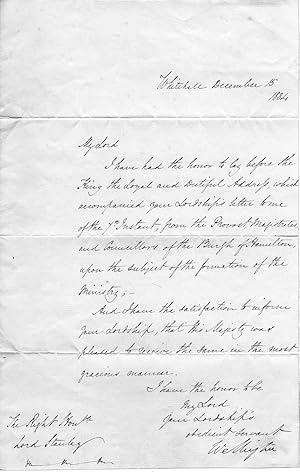About this Item
4to; 4 pp.; Written on first page; pp. 2-4 blank; two small tears at edge of second and third fold, not afffecting text; watermark: J Green & Son 1834. Signed by Wellington. "I have had the honor to lay before the King the Loyal and Dutiful Address, which accompanied your Lordship's letter to me of the 7th Instant, from the Provost, Magistrates, and Councellors of the Burgh of Hamilton, upon the subject of the formation of the Ministry; - And I have the satisfaction to inform your Lordship, that His Majesty was pleased to receive the same in the most gracious manner. .". (cgc.bx). Arthur Wellesley, the 1st Duke of Wellington, was born in Ireland and educated in England. He joined the British Army in I 787 and quickly rose through the ranks to become Field Marshall, and Britain's most accomplished soldier. After the Battle of Waterloo, Wellington used his leadership skills in the affairs of the state. He held many top Tory cabinet positions, including Prime Minister. The 19th century was a significant period of reform in British political history. Edward Smith-Stanley, 14th Earl of Derby (1799-1869),was a British Conservative Whig politician who was first elected as a Member of Parliament in 1820. He was an impressive orator, and he was also an important statesman and Prime Minister. A particularly contentious issue at the time was the severe restrictions imposed on Roman Catholics, who represented the majority of the Irish population. In parliament, the Whigs championed the cause of the Irish, and Stanley spoke for the restoration of their civil and religious rights. The Tories opposed this proposition, until it was feared that Daniel O'Connell would lead Ireland in a civil war. The Catholic Relief Act was passed in I829, but action to bring about reform was slow, fueling further opposition and debate. Stanley was Chief Secretary for Ireland in Lord Grey's reform ministry, and he had a better understanding of the Irish situation than most members of parliament. Catholic emancipation was not accepted by the Tories, but it was clear that the collection of tithes from the impoverished and overwhelmingly Catholic population to support the bench of bishops in Church of Ireland was unfair. Following a heated debate on Irish church revenues, Stanley resigned the ministry on May 27th, 1834. William IV's increasing dissatisfaction with the Whig reformers caused him to dismiss the Melbourne ministry on November 14th, I834. He asked Sir Robert Peel to form a Tory government. Since Peel was travelling in Europe at the time, the Duke of Wellington, by then a close counselor of the King, formed the caretaker government, which he directed until Peel returned to England on December 10th, 1834. At Wellington's suggestion, Peel wrote to Stanley on December 9th, 1834, asking him if he would consider joining the new cabinet. Stanley refused; in his reply to Peel on December I Ith, I834, he stated that even as a former member of Grey's administration, he could share some opinions with Peel, but he would find it difficult to serve in a Tory cabinet, particularly one that included the Duke of Wellington as Foreign Secretary. Peel replied that he would hope to benefit from Stanley's impartial opinions out of office. A year later, Peel formed a new Conservative Party and Stanley was appointed Colonial Secretary. (Ref Alexander, James Edward. Memoirs of the Right Honorable Sir Robert Peel, Bart. London, Newby, 1842). Considering these events at the time this letter was written, it is interesting, more for what it doesn't say than for what it does. Addresses and petitions were regularly sent to the King from towns and boroughs in the kingdom, and this is Wellington's standard response of thanks to the administrators of the Burgh of Hamilton. The address was sent to the King on December 7th, 1834, two days before Stanley received Peel's offer to join his ministry. Wellington is replying on December 15th, 1834, but nowhere does he allude to the. events of. Seller Inventory # 42283
Contact seller
Report this item
![]()
